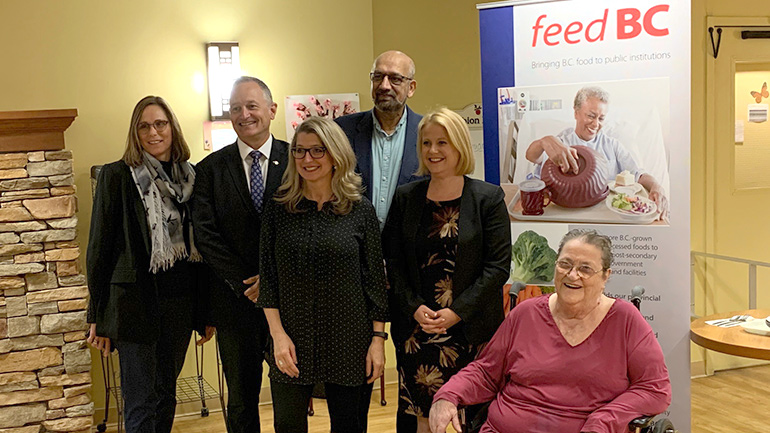
More B.C. ingredients are coming to the nearly five million meals served in hospitals and care facilities
More B.C. ingredients are coming to the nearly five million meals served in hospitals and care facilities in Fraser Health, resulting in more local food for people and expanding an important market for B.C. farmers, ranchers and food processors.
“Hospitals and other government facilities offer B.C.’s farmers, ranchers and food processors a significant market with exciting growth potential,” said Lana Popham, Minister of Agriculture. “I’m so pleased Fraser Health is working closely with the government’s Feed BC program to grow the amount of B.C. food served in its facilities. We are seeing an increase in the amount of local food served in B.C.’s hospitals and care facilities already, and we are just getting started.”
To help B.C. farmers and processors navigate the complex food supply system and sell their products to provincial government facilities, the ministry is providing much-needed information and guidance, including on-farm food-safety training, new technology and business advice. To date, over 200 B.C. food and agriculture businesses have participated in business-development related training offered through Feed BC, building their capacity and readiness to sell to public facilities.
“I am proud to recognize Fraser Health and other health authorities, including Interior Health, which has led the way in offering B.C.-grown produce and foods in its facilities,” said Adrian Dix, Minister of Health. “It’s a big shift, and it has adapted and developed excellent strategies to prioritize B.C. in food services.”
Fraser Health delivers a wide range of health-care services to more than 1.8 million people living in communities stretching from Burnaby to Hope and operates 12 acute care hospitals and a number of long-term care facilities.
While procuring B.C. foods is a priority for health authorities, protecting the health and safety of vulnerable patients is paramount. All food products, including B.C. produced and processed foods, must comply with the highest standards for food safety, nutrition, allergens and traceability.
Quotes
Parm Bains, president and CEO, Westberry Farms
“As a farmer in B.C., Feed BC is opening new lines of business that will boost sales and get local food to more people around the province. This opportunity means a lot to the industry and I am looking forward to watching its continued success.”
Dr. Victoria Lee, president and CEO, Fraser Health
“We’re excited to partner with the B.C. government and local producers to provide more fresh and local food to our patients and residents. Good nutrition plays a fundamental part of a person’s health, well-being and recovery and is complimentary to the care we provide.”
Lisa Beare, MLA for Maple Ridge-Pitt Meadows
“Feed BC is creating more opportunities for the region’s farmers and helping grow the local economy. An initiative like this really pulls the community together to help bring more B.C. food to patients and residents in Fraser Health facilities.”
Bob D’Eith, MLA for Maple Ridge-Mission
“Farmers and processors in B.C. now have the government support needed to help them get their products to patients and residents in hospitals and long-term care facilities like Fraser Health, helping connect the community to B.C.’s agriculture industry and the people who grow their food.”
Quick facts
- Interior Health was first to introduce Feed BC in its health-care facilities and received support to implement strategies to increase its purchase of local foods starting in 2019.
- Health authorities have found success in purchasing and using more B.C. food by introducing more local and seasonal fruit, vegetables and salads; offering a wider variety of local baked goods and sandwich options; and making more items from scratch when possible.
- In 2018, B.C.’s agriculture, seafood and food-processing sectors hit record revenues of $15 billion.
- B.C. food consumption accounted for $6.5 billion, showing strong local support for B.C. food products.
- More than 2,000 new jobs were created in 2017, bringing the total number of people working in B.C.’s agriculture industry in 2018 to more than 63,000.
- In 2018, B.C. food product sales reached $4.5 billion in international exports and more than $6 billion domestically.
